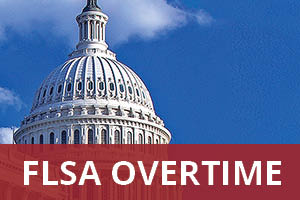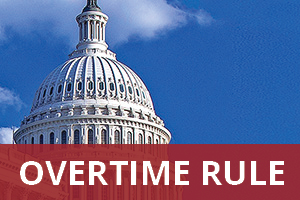by CUPA-HR | November 8, 2023
On November 7, CUPA-HR, joined by 49 other higher education associations, submitted comments in response to the Department of Labor (DOL) Notice of Proposed Rulemaking (NPRM) to update the Fair Labor Standards Act (FLSA) overtime regulations. In the NPRM, the DOL proposes to update the salary threshold for the “white collar” exemptions to the FLSA overtime pay requirements from its current level of $35,568 annually to $60,209 per year — a nearly 70% increase.* Additionally, the department proposes to automatically increase the salary level every three years.
CUPA-HR’s comments highlight the concerns from institutions across the country and ask that the DOL consider four recommendations:
1) The DOL Should Not Update the Salary Threshold at This Time
The DOL most recently updated the minimum salary threshold in 2020. CUPA-HR welcomed updates at the time, given the minimum threshold had not been successfully updated since 2004 and the level proposed in 2019 was appropriate at the time. With the most recent update becoming effective in 2020, we believe it is too soon for the DOL to move forward with another update to the minimum salary threshold.
2) The DOL Should Lower the Proposed Minimum Salary Threshold and Account for Room and Board
If the DOL does choose to move forward with an increase to the threshold, we believe that the proposed minimum salary threshold is too high. Updating the salary level from $684 per week ($35,568 per year) to $1,158 per week ($60,209 per year) leads to a nearly 70% increase, which will result in a large number of employees being reclassified to nonexempt status. To avoid having to reclassify certain employees to nonexempt status, we ask that the DOL consider room and board as part of an employee’s total salary when considering if such employees meet the minimum salary threshold.
3) The DOL Should Not Implement Automatic Updates to the Salary Threshold
In the NPRM, the DOL proposes to implement automatic updates to the salary threshold that would occur every three years. CUPA-HR believes that the DOL does not have the authority to implement automatic updates under the FLSA and that automatic increases will negatively impact institutions’ budgets, their ability to provide merit-based increases, and employee morale.
4) The DOL Should Extend the Effective Date of Any Final Rule Implementing a Higher Salary Threshold
According to the NPRM, the DOL anticipates providing 60 days for compliance with a final rule once it is published by the agency. CUPA-HR believes 60 days is too short a timeframe to assess the impact, plan, and implement appropriate changes on campus. Instead, we ask for an effective date that is at least 180 days after any final rule is published.
CUPA-HR’s president and chief executive officer, Andy Brantley, shared the following: “To say campuses are extremely concerned with the Department of Labor’s proposed rule increasing the minimum salary threshold to the FLSA overtime pay requirements by almost 70% would be an understatement. Employees in positions that clearly meet the three criteria to qualify as white-collar employees who are exempt from the federal overtime pay requirement will be forced into nonexempt positions.”
In addition to submitting these comments, CUPA-HR also joined the Partnership to Protect Workplace Opportunity’s comment letter addressing concerns with the proposed rule. CUPA-HR will keep members apprised of any updates relating to this proposed rule and our advocacy efforts as the department moves toward finalizing these regulations.
* The discrepancy between our figure of $60,209 and the DOL’s preamble figure of $55,068 arises from DOL’s own projections based on anticipated wage growth. The DOL’s proposed rule is rooted in 2022 data (yielding the $55,068 figure), but a footnote in the NPRM confirms that the salary threshold will definitely change by the time the final rule is issued to reflect the most recent data. Our comments, aiming to respond to the most probable salary threshold at the time a final rule is released, references the DOL’s projected figure for Q1 2024, which is $60,209. We do not believe DOL will be able to issue a final rule before Q1 2024, so we are incorporating this projected figure into our response to the NPRM. In essence, our goal is to provide members with a clearer picture of the likely salary figure when the final rule comes into play.
Share This Article:




